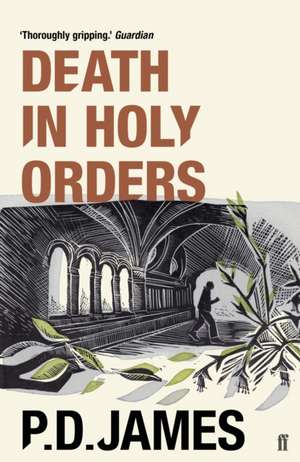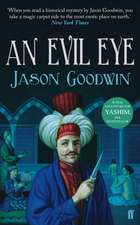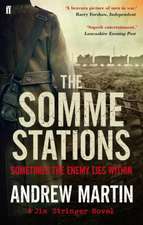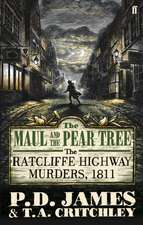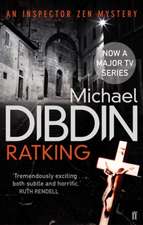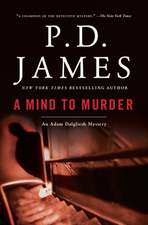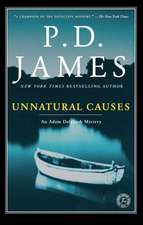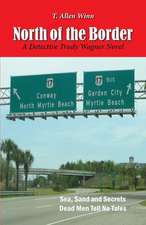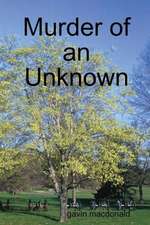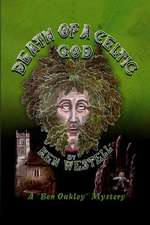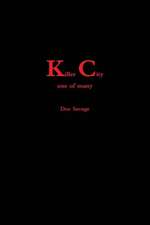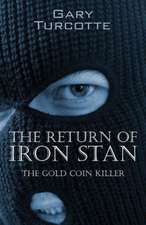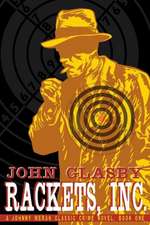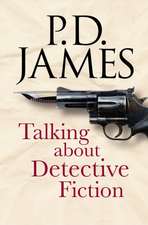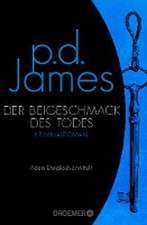Death in Holy Orders
Autor P. D. Jamesen Limba Engleză Paperback – 2 apr 2020
| Toate formatele și edițiile | Preț | Express |
|---|---|---|
| Paperback (2) | 65.88 lei 3-5 săpt. | +17.70 lei 6-10 zile |
| FABER & FABER – 2 apr 2020 | 65.88 lei 3-5 săpt. | +17.70 lei 6-10 zile |
| BALLANTINE BOOKS – 31 dec 2006 | 120.71 lei 3-5 săpt. |
Preț: 65.88 lei
Nou
Puncte Express: 99
Preț estimativ în valută:
12.61€ • 13.74$ • 10.62£
12.61€ • 13.74$ • 10.62£
Carte disponibilă
Livrare economică 02-16 aprilie
Livrare express 18-22 martie pentru 27.69 lei
Preluare comenzi: 021 569.72.76
Specificații
ISBN-13: 9780571355716
ISBN-10: 0571355714
Pagini: 560
Dimensiuni: 131 x 198 x 41 mm
Greutate: 0.43 kg
Ediția:Main - Re-issue
Editura: FABER & FABER
ISBN-10: 0571355714
Pagini: 560
Dimensiuni: 131 x 198 x 41 mm
Greutate: 0.43 kg
Ediția:Main - Re-issue
Editura: FABER & FABER
Notă biografică
P.D. James is the author of sixteen previous books, most of which have been filmed for television. Before her retirement in 1979, she served in the forensics and criminal justice departments of Great Britain's Home Office, and she has been a magistrate and a governor of the BBC. The recipient of many prizes and honours, she was created Baroness James of Holland Park in 1991. In 2000 she celebrated her eightieth birthday and published her autobiography, Time to Be in Earnest.
From the Paperback edition.
From the Paperback edition.
Extras
BOOK ONE
The Killing Sand
1.
It was Father Martin's idea that I should write an account of how I found the body.
I asked, "You mean, as if I were writing a letter, telling it to a friend?"
Father Martin said, "Writing it down as if it were fiction, as if you were standing outside yourself, watching it happen, remembering what you did, what you felt, as if it were all happening to someone else."
I knew what he meant, but I wasn't sure I knew where to begin. I said, "Everything that happened, Father, or just that walk along the beach, uncovering Ronald's body?"
"Anything and everything you want to say. Write about the college and about your life here if you like. I think you might find it helpful."
"Did you find it helpful, Father?"
I don't know why I spoke these words, they just came into my mind and I let them out. It was silly really, and in a way it was impertinent, but he didn't seem to mind.
After a pause he said, "No, it didn't really help me, but then, it was all a very long time ago. I think it might be different for you."
I suppose he was thinking about the war and being taken prisoner by the Japanese, the awful events that happened in the camp. He never speaks about the war, but then, why should he do so to me? But I don't think he speaks to anyone, not even to the other priests.
This conversation happened two days ago, when we were walking together through the cloisters after Evensong. I don't go to Mass any more, not since Charlie died, but I do go to Evensong. It's a matter of courtesy really. It doesn't seem right working at the college, taking money from them, accepting all their kindness and never attending any of the services in the church. But perhaps I'm being too sensitive. Mr. Gregory lives in one of the cottages, as I do, and teaches Greek part-time, but he never attends church except when there is music he wants to hear. No one ever presses me to attend, they never even asked why I stopped coming to Mass. But of course they noticed; they notice everything.
When I got back to my cottage I thought about what Father Martin had said and whether perhaps it might not be a good idea. I've never had any difficulty about writing. At school I was good at composition and Miss Allison, who taught us English, said she thought I might have the talent to be a writer. But I knew that she was wrong. I haven't any imagination, not the kind novelists need. I can't make things up. I can only write about what I see and do and know--and sometimes what I feel, which isn't as easy. Anyway, I always wanted to be a nurse, even from childhood. I'm sixty-four and retired now, but I still keep my hand in here at St. Anselm's. I'm partly the Matron, dealing with minor illnesses, and I also look after the linen. It's an easy job but I've got a weak heart and I'm lucky to be working. The college make it as easy as possible for me. They've even provided a lightweight trolley so that I'm not tempted to carry heavy bundles of linen. I ought to have said all this before. And I haven't even written down my name. It's Munroe, Margaret Munroe.
I think I know why Father Martin suggested it would be helpful if I began writing again. He knows that I used to write a long letter to Charlie every week. I think he's the only person here except Ruby Pilbeam who does know that. Every week I'd sit down and remember what had happened since the last letter, the small unimportant things which wouldn't be unimportant to Charlie: the meals I ate, the jokes I heard, stories about the students, descriptions of the weather. You wouldn't think there would be much to tell in a quiet place like this on the edge of the cliffs, remote from anywhere, but it was surprising what I found to write to him. And I know Charlie loved the letters. "Keep on writing, Mum," he would say when he was home on leave. And I did.
After he was killed, the Army sent me back all his belongings and there was the bundle of letters among them. Not every one I'd written, he couldn't have kept them all, but he did keep some of the longest. I took them onto the headland and made a bonfire. It was a windy day, as it often is on the East Coast, and the flames roared and spat and changed direction with the wind. The charred pieces of paper rose and whirled about my face like black moths and the smoke stung my nose. It was odd, because it was only a little fire. But what I'm trying to say is that I know why Father Martin suggested I should write this account. He thought that writing something--anything--might help to bring me back to life. He's a good man, perhaps he's even a holy man, but there's so much he doesn't understand.
It seems strange to be writing this account without knowing who, if anyone, will ever see it. And I'm not sure whether I'm writing for myself or for some imaginary reader to whom everything about St. Anselm's will be new and strange. So perhaps I ought to write something about the college, to set the scene, as it were. It was founded in 1861 by a pious lady called Miss Agnes Arbuthnot, who wanted to ensure that there would always be "devout and learned young men ordained to the Catholic priesthood in the Church of England." I've put in the inverted commas because those are her words. There's a booklet about her in the church and that's how I know. She gave the buildings, the land and nearly all her furniture, and enough money--so she thought--to keep the college going for ever. But there never is enough money, and now St. Anselm's has to be mainly financed by the Church. I know that Father Sebastian and Father Martin are afraid that the Church is planning to close it down. This fear is never openly discussed, and certainly not with the staff, though we all know. In a small and isolated community like St. Anselm's, news and gossip seem to be carried, unspoken, on the wind.
Apart from giving the house, Miss Arbuthnot built the north and south cloisters at the back to provide rooms for the students, and a set of guest-rooms linking the south cloister to the church. She also built four cottages for staff, arranged in a semicircle on the headland about a hundred yards from the college. She named them after the four evangelists. I am in St. Matthew, the most southerly. Ruby Pilbeam, who is the cook-housekeeper, and her husband, the general handyman, are in St. Mark. Mr. Gregory is in St. Luke, and in the northern cottage, St. John, is Eric Surtees, who helps Mr. Pilbeam. Eric keeps pigs, but more as a hobby than to provide pork for the college. There are just the four of us, with part-time cleaning women from Reydon and Lowestoft to help out, but there are never more than twenty ordinands and four resident priests, and we manage. None of us would be easy to replace. This windswept desolate headland with no village, no pub, no shop, is too remote for most people. I like it here but even I can find it frightening and a little sinister. The sea is eating away the sandy cliffs year by year, and sometimes I stand on the edge looking out to sea and can imagine a great tidal wave rearing up, white and glistening, racing towards the shore to crash over the turrets and towers, the church and the cottages, and wash us all away. The old village of Ballard's Mere has been under the sea for centuries, and sometimes on windy nights folks say it's possible to hear the faint ringing of church bells from the buried towers. And what the sea didn't take was destroyed in a great fire in 1695. Nothing of the old village now remains except the medieval church, which Miss Arbuthnot restored and made part of the college, and the two crumbling red brick pillars fronting the house, which are all that are left of the Elizabethan manor house that stood on the site.
I'd better try to explain something about Ronald Treeves, the boy who died. After all, his death is what this is supposed to be about. Before the inquest the police questioned me, asking how well I had known him. I suppose I knew him better than most of the staff here, but I didn't say much. There wasn't much I could tell. I didn't think it was my place to gossip about the students. I knew that he wasn't popular but I didn't tell them that. The trouble was that he didn't really fit in, and I think he knew that he didn't. For one thing, his father was Sir Alred Treeves, who runs an important armaments company, and Ronald liked us to know that he was the son of a very rich man. The things he owned showed it too. He had a Porsche while the other students make do with cheaper cars--if they have a car at all. And he talked about his holidays in expensive and remote places that other students wouldn't be able to travel to, at least not in vacations.
All that might have gained him popularity in some colleges, but not here. Everyone is snobbish about something, don't let them tell you differently, but here it isn't about money. It isn't really about family either, although you'd do better as the son of a curate than you would as the son of a pop star. I suppose what they really care about is cleverness--cleverness and good looks and wit. They like people who can make them laugh. Ronald wasn't as clever as he thought he was and he never made anyone laugh. They thought he was dull, and of course when he realized that, he became duller. I didn't say any of this to the police. What would have been the point? He was dead. Oh, and I think he was a bit of a snooper too, always wanting to know what was going on, asking questions. He didn't get much out of me. But some evenings he would turn up at the cottage and sit and talk while I knitted and listened. The students are discouraged from visiting the staff cottages except by invitation. Father Sebastian likes us to have our privacy. But I didn't mind him really. Looking back on it, I think he was lonely. Well, he wouldn't have bothered with me otherwise. And I remembered my Charlie. Charlie wasn't dull or unpopular or boring, but I like to think that if he'd ever been lonely and wanted to sit quietly and talk, there would have been someone like me to give him a welcome.
When the police arrived they asked me why I had gone looking for him on the beach. But, of course, I hadn't. About twice a week I take a solitary walk after I've had lunch, and when I set out I didn't even realize that Ronald was missing. And I wouldn't have started looking on the beach. It's difficult to think what could happen to anyone on a deserted shore. It's safe enough if you don't clamber over the groynes or walk too close to the cliffs, and there are notices about the dangers of both. All the students are warned when they first arrive about the risk of swimming alone or walking too close to the unstable cliffs.
In Miss Arbuthnot's time it was possible to get down to the beach from the house, but the encroaching sea has changed all that. Now we have to walk about a half-mile south of the college to the only place where the cliffs are low and firm enough to support some half-dozen rickety wooden steps with a handrail. Beyond this point is the darkness of Ballard's Mere, surrounded by trees and separated from the sea only by a narrow bank of shingle. Sometimes I walk as far as the mere and then turn back, but that day I went down the steps to the beach and started walking northward.
After a night of rain it was a fresh, lively day, the sky blue with scudding clouds, the tide running high. I rounded a slight promontory and saw the deserted beach stretching out before me with its narrow ridges of shingle and the dark lines of the old weed-encrusted groynes crumbling into the sea. And then, about thirty yards ahead, I saw what looked like a black bundle lying at the foot of the cliff. I hurried up to it and found a cassock, neatly folded, and beside it a brown cloak, also carefully folded. Within a few feet the cliff had slithered and tumbled and now lay in great clumps of compacted sand, tufts of grass, and stones. I knew at once what must have happened. I think I gave a little cry, and then I began scraping away at the sand. I knew a body must be buried underneath it, but it wasn't possible to know where. I remember the gritty sand under my nails and how slow my progress seemed, so that I began kicking the sand with my feet as if in anger, spraying it high so that it stung my face and got into my eyes. Then I noticed a sharp-edged spar of wood about thirty yards towards the sea. I fetched it and used it to start probing. After a few minutes it struck something soft and I knelt and began working again with my hands. Then I saw that what it had struck were two sand-encrusted buttocks, covered in fawn corduroy.
After that I couldn't go on. My heart was pounding and I had no more strength. I felt, obscurely, that I had humiliated whoever lay there, that there was something ridiculous and almost indecent about the two exposed mounds. I knew that he must be dead and that all my feverish haste hadn't really been important. I couldn't have saved him and now I couldn't bear to go on alone, uncovering him inch by inch, even if I'd had the strength. I had to get help, to break the news of what had happened. I think I knew even then whose body it was, but suddenly I remembered that all the ordinands' brown cloaks have name tabs. I turned back the collar of the cloak and read the name.
I remember stumbling down the beach on the firm edge of sand between the banks of pebbles and somehow dragging myself up the steps to the top of the cliff. I began running along the cliff road to the college. It was only a half-mile but the road seemed endless and the house seemed to recede with every painful step. My heart was beginning to pound and my legs felt as if the bones were dissolving. And then I heard a car. Looking back, I saw it turning from the access road and coming towards me along the rough track bordering the cliff edge. I stood in the middle of the track and waved my arms and the car slowed. I saw that it was Mr. Gregory.
I can't remember how I broke the news. I have a picture of myself standing there, caked in sand, hair blowing in the wind, gesticulating towards the sea. He didn't say anything, but silently opened the car door and I got in. I suppose it would have been sensible to drive on to the college but, instead, he turned the car and we got out at the steps to the beach. I've wondered since whether he didn't believe me and wanted to see for himself before calling for help. I can't remember the walk, and the last clear picture is of us standing together by Ronald's body. Still without speaking, Mr. Gregory knelt in the sand and began digging with his hands. He was wearing leather gloves and that made it easier for him. We both worked in silence, feverishly shifting the sand, working up to the top of the body.
Above the corduroy trousers Ronald was wearing only a grey shirt. We uncovered the back of his head. It was like uncovering an animal, a dead dog or a cat. The deeper sand was still moist and his straw-coloured hair was matted with it. I tried to brush it away and it felt cold and gritty on my palms.
Mr. Gregory said sharply, "Don't touch him!" and I took my hand away quickly, as if it had been burned. Then he said very quietly, "We'd better leave him now, just as we found him. It's clear who it is."
I knew that he was dead, but somehow I thought we ought to turn him over. I had some ridiculous idea that we could give him mouth-to-mouth breathing. I knew it wasn't rational, but I still felt we ought to do something. But Mr. Gregory took off his left glove and put two fingers against Ronald's neck. Then he said, "He's dead, but of course he's dead. There's nothing we can do for him."
We were both silent for a moment, kneeling there on each side of him. We must have looked as if we were praying, and I would have said a prayer for him only I couldn't think of the right words. And then the sun came out and suddenly the scene looked as if it wasn't real, as if the two of us were being photographed in colour. Everything was bright and clear-edged. The grains of sand on Ronald's hair shone like pin-points of light.
Mr. Gregory said, "We must get some help, call the police. Do you mind waiting here with him? I won't be long. Or you can come with me if you prefer, but I think it would be better if one of us stayed."
I said, "You go. You'll be quicker in the car. I don't mind waiting."
I watched him as he walked as briskly as the shingle allowed towards the mere, then round the promontory and out of sight. A minute later I heard the sound of the car as he drove towards the college. I half-slid down the sand a little way from the body and settled myself on the pebbles, wriggling to make myself more comfortable and digging in my heels. The pebbles beneath the surface were still damp from the night rain, and the cold wetness seeped through the cotton of my slacks. I sat with my arms folded round my knees, looking out over the sea.
And sitting there I thought of Mike for the first time in years. He was killed when his motorcycle skidded off the A1 and into a tree. We had been home from our honeymoon for less than two weeks; we had known each other for less than a year. What I felt at his death was shock and disbelief, not grief. I thought at the time that it was grief but I know better now. I was in love with Mike but I didn't love him. That comes with living together and caring for each other, and we never had the time. After he died I knew that I was Margaret Munroe, widow, but I felt that I was still Margaret Parker, spinster, aged twenty-one, a recently qualified nurse. When I discovered I was pregnant, that too seemed unreal. The baby, when he arrived, seemed nothing to do with Mike or our brief time together, and nothing to do with me. All that came later, and perhaps it was the stronger because it came late. When Charlie died I mourned for both of them, but I still can't clearly recall Mike's face.
I was aware of Ronald's body behind me, but it was a comfort not to be sitting at his side. Some people taking watch beside the dead find their presence companionable, but I didn't feel that, not with Ronald. All I felt was a great sadness. It wasn't for that poor boy, it wasn't even for Charlie or Mike or for myself. It was a universal sadness which seemed to permeate everything round me, the fresh breeze against my cheek, the sky where there were a few massed clouds moving almost deliberately, it seemed, across the blue, and the sea itself. I found myself thinking of all the people who had lived and died on this coast, and of the bones lying a mile out under the waves in the great churchyards. Their lives must have mattered at the time to themselves and the people who cared about them, but now they were dead and it would have been just the same if they had never lived. In a hundred years no one will remember Charlie, Mike or me. All our lives are as insignificant as a single grain of sand. My mind felt emptied, even of sadness. Instead, gazing out to sea, accepting that in the end nothing really matters and that all we have is the present moment to endure or enjoy, I felt at peace.
I suppose I was sitting in a kind of trance, because I didn't see or hear the three approaching figures until there was the loud crunch of shingle and they had almost reached me. Father Sebastian and Mr. Gregory were trudging side by side. Father Sebastian had wrapped his black cloak tightly round him against the wind. Both their heads were bent and they walked purposefully, as if they were marching. Father Martin was a little way behind, lurching as he struggled with difficulty over the shingle. I remember thinking that it was unkind of the other two not to wait for him.
I felt embarrassed to be discovered sitting. I got up, and Father Sebastian said, "Are you all right, Margaret?"
I said, "Yes, Father," and then stood aside as the three of them walked up to the body.
Father Sebastian made the sign of the cross, then said, "This is a disaster."
Even at the time I thought it was a strange word to use and I knew that he wasn't just thinking at that moment of Ronald Treeves; he was thinking of the college.
He bent down and put his hand against the back of Ronald's neck and Mr. Gregory said, quite sharply, "He's dead of course. Better not disturb the body any further."
Father Martin was standing a little apart. I saw his lips moving and I think he was praying.
Father Sebastian said, "If you, Gregory, will go back to the college and watch for the police, Father Martin and I will stay here. Margaret had better go with you. This has been a shock for her. Take her to Mrs. Pilbeam, if you will, and explain what's happened. Mrs. Pilbeam will make her some hot tea and look after her. Neither of them are to say anything until I inform the college. If the police want to talk to Margaret they can do so later."
It's funny, but I remember feeling a slight sense of resentment that he had spoken to Mr. Gregory almost as if I wasn't there. And I didn't really want to be taken to Ruby Pilbeam's cottage. I like Ruby, who has always managed to be kind without being interfering, but all I wanted was to go home.
Father Sebastian came up and laid a hand on my shoulder. He said, "You've been very brave, Margaret, thank you. Go with Mr. Gregory now and I'll come to see you later. Father Martin and I will sit here with Ronald."
It was the first time he had spoken the boy's name.
In the car Mr. Gregory drove for a few minutes in silence, then said, "That's a curious death. I wonder what the Coroner--or, come to that, the police--will make of it."
I said, "Surely it was an accident."
"A curious accident, wouldn't you say?" I didn't reply, then he said, "This isn't the first dead body you've seen, of course. You'll be accustomed to death."
"I'm a nurse, Mr. Gregory."
I thought of the first body I'd seen, all those years ago, as an eighteen-year-old probationer, the first body I'd laid out. Nursing was different in those days. We used to lay out the dead ourselves and it was done with great reverence and in silence behind the screens. My first ward sister used to join us to say a prayer before we began. She told us that this was the last service we could render our patients. But I wasn't going to talk to Mr. Gregory about that.
He said, "Seeing a dead body, any body, is a comforting reassurance that we may live as men but we die as animals. Personally I find that a relief. I can't imagine any greater horror than eternal life."
I still didn't reply. It's not that I dislike him: we hardly ever meet. Ruby Pilbeam cleans his cottage once a week and does his washing. It's a private arrangement they have. But he and I have never been on chatting terms and I wasn't in the mood to begin now.
The car turned westward between the twin towers and into the courtyard. Releasing his seat belt and helping me with mine, he said, "I'll walk with you to Mrs. Pilbeam's. She may not be in. If not, you had better come to my cottage. What we both need is a drink."
But she was in and I was glad of it after all. Mr. Gregory reported the facts very briefly and said, "Father Sebastian and Father Martin are with the body now and the police will arrive very soon. Please don't mention this to anyone else until Father Sebastian returns. He'll then speak to the whole college."
After he had gone Ruby did indeed make tea, hot and strong and very comforting. She fussed over me but I can't remember the words or the gestures. I didn't say much but she didn't expect me to. She treated me as if I were ill, settling me in one of the easy chairs before the fireplace, switching on two bars of the electric fire in case I felt cold with shock, and then drawing the curtains so that I could have what she described as "a good long rest."
I suppose it was about an hour before the police arrived, a youngish sergeant with a Welsh accent. He was kind and patient and I answered his questions quite calmly. There wasn't, after all, very much to tell. He asked me how well I'd known Ronald, the last time I'd seen him and whether he'd been depressed lately. I said I'd last seen him the previous evening, walking towards Mr. Gregory's cottage, I suppose for his Greek lesson. Term had only just started and that's all I had seen of him. I got the impression that the police sergeant--I think his name was Jones or Evans, a Welsh name anyway--was sorry he'd asked the question about Ronald being depressed. Anyway, he said that it all looked quite straightforward, asked Ruby the same questions and then left.
Father Sebastian broke the news of Ronald's death to the whole college when they assembled before five o'clock Evensong. Most of the ordinands had guessed by then that something tragic had happened; police cars and a mortuary van don't arrive in secret. I didn't go to the library, so I never heard what Father Sebastian said. All I wanted by then was to be alone. But later in the evening the senior student, Raphael Arbuthnot, brought me a small pot of blue African violets with the sympathy of all the ordinands. One of them must have driven into Pakefield or Lowestoft to buy them. When he gave them to me, Raphael bent down and kissed my cheek. He said, "I'm so sorry, Margaret." It was the kind of thing people say at a time like that, but it didn't sound commonplace. What it sounded like was an apology.
It was two nights later that the nightmares began. I have never suffered from nightmares before, not even when I was a student nurse and first encountered death. The dreams are horrible, and now I sit in front of the television until late every evening, dreading the moment when tiredness drives me to bed. The dream is always the same. Ronald Treeves is standing beside the bed. He is naked and his body is plastered with damp sand. It is matted in his fair hair and over his face. Only the eyes are free of sand, and they gaze at me reproachfully, as if asking why I didn't do more to save him. I know that there was nothing I could have done. I know that he was dead long before I came upon his body. But still he appears night after night, with that accusing reproachful gaze, the damp sand falling in clumps from his plain, rather pudgy face.
Perhaps now that I have written it down he will leave me in peace. I don't think I am a fanciful woman, but there is something strange about his death, something I ought to remember but which lies nagging at the back of my mind. Something tells me that Ronald Treeves's death wasn't an end but a beginning.
From the Hardcover edition.
The Killing Sand
1.
It was Father Martin's idea that I should write an account of how I found the body.
I asked, "You mean, as if I were writing a letter, telling it to a friend?"
Father Martin said, "Writing it down as if it were fiction, as if you were standing outside yourself, watching it happen, remembering what you did, what you felt, as if it were all happening to someone else."
I knew what he meant, but I wasn't sure I knew where to begin. I said, "Everything that happened, Father, or just that walk along the beach, uncovering Ronald's body?"
"Anything and everything you want to say. Write about the college and about your life here if you like. I think you might find it helpful."
"Did you find it helpful, Father?"
I don't know why I spoke these words, they just came into my mind and I let them out. It was silly really, and in a way it was impertinent, but he didn't seem to mind.
After a pause he said, "No, it didn't really help me, but then, it was all a very long time ago. I think it might be different for you."
I suppose he was thinking about the war and being taken prisoner by the Japanese, the awful events that happened in the camp. He never speaks about the war, but then, why should he do so to me? But I don't think he speaks to anyone, not even to the other priests.
This conversation happened two days ago, when we were walking together through the cloisters after Evensong. I don't go to Mass any more, not since Charlie died, but I do go to Evensong. It's a matter of courtesy really. It doesn't seem right working at the college, taking money from them, accepting all their kindness and never attending any of the services in the church. But perhaps I'm being too sensitive. Mr. Gregory lives in one of the cottages, as I do, and teaches Greek part-time, but he never attends church except when there is music he wants to hear. No one ever presses me to attend, they never even asked why I stopped coming to Mass. But of course they noticed; they notice everything.
When I got back to my cottage I thought about what Father Martin had said and whether perhaps it might not be a good idea. I've never had any difficulty about writing. At school I was good at composition and Miss Allison, who taught us English, said she thought I might have the talent to be a writer. But I knew that she was wrong. I haven't any imagination, not the kind novelists need. I can't make things up. I can only write about what I see and do and know--and sometimes what I feel, which isn't as easy. Anyway, I always wanted to be a nurse, even from childhood. I'm sixty-four and retired now, but I still keep my hand in here at St. Anselm's. I'm partly the Matron, dealing with minor illnesses, and I also look after the linen. It's an easy job but I've got a weak heart and I'm lucky to be working. The college make it as easy as possible for me. They've even provided a lightweight trolley so that I'm not tempted to carry heavy bundles of linen. I ought to have said all this before. And I haven't even written down my name. It's Munroe, Margaret Munroe.
I think I know why Father Martin suggested it would be helpful if I began writing again. He knows that I used to write a long letter to Charlie every week. I think he's the only person here except Ruby Pilbeam who does know that. Every week I'd sit down and remember what had happened since the last letter, the small unimportant things which wouldn't be unimportant to Charlie: the meals I ate, the jokes I heard, stories about the students, descriptions of the weather. You wouldn't think there would be much to tell in a quiet place like this on the edge of the cliffs, remote from anywhere, but it was surprising what I found to write to him. And I know Charlie loved the letters. "Keep on writing, Mum," he would say when he was home on leave. And I did.
After he was killed, the Army sent me back all his belongings and there was the bundle of letters among them. Not every one I'd written, he couldn't have kept them all, but he did keep some of the longest. I took them onto the headland and made a bonfire. It was a windy day, as it often is on the East Coast, and the flames roared and spat and changed direction with the wind. The charred pieces of paper rose and whirled about my face like black moths and the smoke stung my nose. It was odd, because it was only a little fire. But what I'm trying to say is that I know why Father Martin suggested I should write this account. He thought that writing something--anything--might help to bring me back to life. He's a good man, perhaps he's even a holy man, but there's so much he doesn't understand.
It seems strange to be writing this account without knowing who, if anyone, will ever see it. And I'm not sure whether I'm writing for myself or for some imaginary reader to whom everything about St. Anselm's will be new and strange. So perhaps I ought to write something about the college, to set the scene, as it were. It was founded in 1861 by a pious lady called Miss Agnes Arbuthnot, who wanted to ensure that there would always be "devout and learned young men ordained to the Catholic priesthood in the Church of England." I've put in the inverted commas because those are her words. There's a booklet about her in the church and that's how I know. She gave the buildings, the land and nearly all her furniture, and enough money--so she thought--to keep the college going for ever. But there never is enough money, and now St. Anselm's has to be mainly financed by the Church. I know that Father Sebastian and Father Martin are afraid that the Church is planning to close it down. This fear is never openly discussed, and certainly not with the staff, though we all know. In a small and isolated community like St. Anselm's, news and gossip seem to be carried, unspoken, on the wind.
Apart from giving the house, Miss Arbuthnot built the north and south cloisters at the back to provide rooms for the students, and a set of guest-rooms linking the south cloister to the church. She also built four cottages for staff, arranged in a semicircle on the headland about a hundred yards from the college. She named them after the four evangelists. I am in St. Matthew, the most southerly. Ruby Pilbeam, who is the cook-housekeeper, and her husband, the general handyman, are in St. Mark. Mr. Gregory is in St. Luke, and in the northern cottage, St. John, is Eric Surtees, who helps Mr. Pilbeam. Eric keeps pigs, but more as a hobby than to provide pork for the college. There are just the four of us, with part-time cleaning women from Reydon and Lowestoft to help out, but there are never more than twenty ordinands and four resident priests, and we manage. None of us would be easy to replace. This windswept desolate headland with no village, no pub, no shop, is too remote for most people. I like it here but even I can find it frightening and a little sinister. The sea is eating away the sandy cliffs year by year, and sometimes I stand on the edge looking out to sea and can imagine a great tidal wave rearing up, white and glistening, racing towards the shore to crash over the turrets and towers, the church and the cottages, and wash us all away. The old village of Ballard's Mere has been under the sea for centuries, and sometimes on windy nights folks say it's possible to hear the faint ringing of church bells from the buried towers. And what the sea didn't take was destroyed in a great fire in 1695. Nothing of the old village now remains except the medieval church, which Miss Arbuthnot restored and made part of the college, and the two crumbling red brick pillars fronting the house, which are all that are left of the Elizabethan manor house that stood on the site.
I'd better try to explain something about Ronald Treeves, the boy who died. After all, his death is what this is supposed to be about. Before the inquest the police questioned me, asking how well I had known him. I suppose I knew him better than most of the staff here, but I didn't say much. There wasn't much I could tell. I didn't think it was my place to gossip about the students. I knew that he wasn't popular but I didn't tell them that. The trouble was that he didn't really fit in, and I think he knew that he didn't. For one thing, his father was Sir Alred Treeves, who runs an important armaments company, and Ronald liked us to know that he was the son of a very rich man. The things he owned showed it too. He had a Porsche while the other students make do with cheaper cars--if they have a car at all. And he talked about his holidays in expensive and remote places that other students wouldn't be able to travel to, at least not in vacations.
All that might have gained him popularity in some colleges, but not here. Everyone is snobbish about something, don't let them tell you differently, but here it isn't about money. It isn't really about family either, although you'd do better as the son of a curate than you would as the son of a pop star. I suppose what they really care about is cleverness--cleverness and good looks and wit. They like people who can make them laugh. Ronald wasn't as clever as he thought he was and he never made anyone laugh. They thought he was dull, and of course when he realized that, he became duller. I didn't say any of this to the police. What would have been the point? He was dead. Oh, and I think he was a bit of a snooper too, always wanting to know what was going on, asking questions. He didn't get much out of me. But some evenings he would turn up at the cottage and sit and talk while I knitted and listened. The students are discouraged from visiting the staff cottages except by invitation. Father Sebastian likes us to have our privacy. But I didn't mind him really. Looking back on it, I think he was lonely. Well, he wouldn't have bothered with me otherwise. And I remembered my Charlie. Charlie wasn't dull or unpopular or boring, but I like to think that if he'd ever been lonely and wanted to sit quietly and talk, there would have been someone like me to give him a welcome.
When the police arrived they asked me why I had gone looking for him on the beach. But, of course, I hadn't. About twice a week I take a solitary walk after I've had lunch, and when I set out I didn't even realize that Ronald was missing. And I wouldn't have started looking on the beach. It's difficult to think what could happen to anyone on a deserted shore. It's safe enough if you don't clamber over the groynes or walk too close to the cliffs, and there are notices about the dangers of both. All the students are warned when they first arrive about the risk of swimming alone or walking too close to the unstable cliffs.
In Miss Arbuthnot's time it was possible to get down to the beach from the house, but the encroaching sea has changed all that. Now we have to walk about a half-mile south of the college to the only place where the cliffs are low and firm enough to support some half-dozen rickety wooden steps with a handrail. Beyond this point is the darkness of Ballard's Mere, surrounded by trees and separated from the sea only by a narrow bank of shingle. Sometimes I walk as far as the mere and then turn back, but that day I went down the steps to the beach and started walking northward.
After a night of rain it was a fresh, lively day, the sky blue with scudding clouds, the tide running high. I rounded a slight promontory and saw the deserted beach stretching out before me with its narrow ridges of shingle and the dark lines of the old weed-encrusted groynes crumbling into the sea. And then, about thirty yards ahead, I saw what looked like a black bundle lying at the foot of the cliff. I hurried up to it and found a cassock, neatly folded, and beside it a brown cloak, also carefully folded. Within a few feet the cliff had slithered and tumbled and now lay in great clumps of compacted sand, tufts of grass, and stones. I knew at once what must have happened. I think I gave a little cry, and then I began scraping away at the sand. I knew a body must be buried underneath it, but it wasn't possible to know where. I remember the gritty sand under my nails and how slow my progress seemed, so that I began kicking the sand with my feet as if in anger, spraying it high so that it stung my face and got into my eyes. Then I noticed a sharp-edged spar of wood about thirty yards towards the sea. I fetched it and used it to start probing. After a few minutes it struck something soft and I knelt and began working again with my hands. Then I saw that what it had struck were two sand-encrusted buttocks, covered in fawn corduroy.
After that I couldn't go on. My heart was pounding and I had no more strength. I felt, obscurely, that I had humiliated whoever lay there, that there was something ridiculous and almost indecent about the two exposed mounds. I knew that he must be dead and that all my feverish haste hadn't really been important. I couldn't have saved him and now I couldn't bear to go on alone, uncovering him inch by inch, even if I'd had the strength. I had to get help, to break the news of what had happened. I think I knew even then whose body it was, but suddenly I remembered that all the ordinands' brown cloaks have name tabs. I turned back the collar of the cloak and read the name.
I remember stumbling down the beach on the firm edge of sand between the banks of pebbles and somehow dragging myself up the steps to the top of the cliff. I began running along the cliff road to the college. It was only a half-mile but the road seemed endless and the house seemed to recede with every painful step. My heart was beginning to pound and my legs felt as if the bones were dissolving. And then I heard a car. Looking back, I saw it turning from the access road and coming towards me along the rough track bordering the cliff edge. I stood in the middle of the track and waved my arms and the car slowed. I saw that it was Mr. Gregory.
I can't remember how I broke the news. I have a picture of myself standing there, caked in sand, hair blowing in the wind, gesticulating towards the sea. He didn't say anything, but silently opened the car door and I got in. I suppose it would have been sensible to drive on to the college but, instead, he turned the car and we got out at the steps to the beach. I've wondered since whether he didn't believe me and wanted to see for himself before calling for help. I can't remember the walk, and the last clear picture is of us standing together by Ronald's body. Still without speaking, Mr. Gregory knelt in the sand and began digging with his hands. He was wearing leather gloves and that made it easier for him. We both worked in silence, feverishly shifting the sand, working up to the top of the body.
Above the corduroy trousers Ronald was wearing only a grey shirt. We uncovered the back of his head. It was like uncovering an animal, a dead dog or a cat. The deeper sand was still moist and his straw-coloured hair was matted with it. I tried to brush it away and it felt cold and gritty on my palms.
Mr. Gregory said sharply, "Don't touch him!" and I took my hand away quickly, as if it had been burned. Then he said very quietly, "We'd better leave him now, just as we found him. It's clear who it is."
I knew that he was dead, but somehow I thought we ought to turn him over. I had some ridiculous idea that we could give him mouth-to-mouth breathing. I knew it wasn't rational, but I still felt we ought to do something. But Mr. Gregory took off his left glove and put two fingers against Ronald's neck. Then he said, "He's dead, but of course he's dead. There's nothing we can do for him."
We were both silent for a moment, kneeling there on each side of him. We must have looked as if we were praying, and I would have said a prayer for him only I couldn't think of the right words. And then the sun came out and suddenly the scene looked as if it wasn't real, as if the two of us were being photographed in colour. Everything was bright and clear-edged. The grains of sand on Ronald's hair shone like pin-points of light.
Mr. Gregory said, "We must get some help, call the police. Do you mind waiting here with him? I won't be long. Or you can come with me if you prefer, but I think it would be better if one of us stayed."
I said, "You go. You'll be quicker in the car. I don't mind waiting."
I watched him as he walked as briskly as the shingle allowed towards the mere, then round the promontory and out of sight. A minute later I heard the sound of the car as he drove towards the college. I half-slid down the sand a little way from the body and settled myself on the pebbles, wriggling to make myself more comfortable and digging in my heels. The pebbles beneath the surface were still damp from the night rain, and the cold wetness seeped through the cotton of my slacks. I sat with my arms folded round my knees, looking out over the sea.
And sitting there I thought of Mike for the first time in years. He was killed when his motorcycle skidded off the A1 and into a tree. We had been home from our honeymoon for less than two weeks; we had known each other for less than a year. What I felt at his death was shock and disbelief, not grief. I thought at the time that it was grief but I know better now. I was in love with Mike but I didn't love him. That comes with living together and caring for each other, and we never had the time. After he died I knew that I was Margaret Munroe, widow, but I felt that I was still Margaret Parker, spinster, aged twenty-one, a recently qualified nurse. When I discovered I was pregnant, that too seemed unreal. The baby, when he arrived, seemed nothing to do with Mike or our brief time together, and nothing to do with me. All that came later, and perhaps it was the stronger because it came late. When Charlie died I mourned for both of them, but I still can't clearly recall Mike's face.
I was aware of Ronald's body behind me, but it was a comfort not to be sitting at his side. Some people taking watch beside the dead find their presence companionable, but I didn't feel that, not with Ronald. All I felt was a great sadness. It wasn't for that poor boy, it wasn't even for Charlie or Mike or for myself. It was a universal sadness which seemed to permeate everything round me, the fresh breeze against my cheek, the sky where there were a few massed clouds moving almost deliberately, it seemed, across the blue, and the sea itself. I found myself thinking of all the people who had lived and died on this coast, and of the bones lying a mile out under the waves in the great churchyards. Their lives must have mattered at the time to themselves and the people who cared about them, but now they were dead and it would have been just the same if they had never lived. In a hundred years no one will remember Charlie, Mike or me. All our lives are as insignificant as a single grain of sand. My mind felt emptied, even of sadness. Instead, gazing out to sea, accepting that in the end nothing really matters and that all we have is the present moment to endure or enjoy, I felt at peace.
I suppose I was sitting in a kind of trance, because I didn't see or hear the three approaching figures until there was the loud crunch of shingle and they had almost reached me. Father Sebastian and Mr. Gregory were trudging side by side. Father Sebastian had wrapped his black cloak tightly round him against the wind. Both their heads were bent and they walked purposefully, as if they were marching. Father Martin was a little way behind, lurching as he struggled with difficulty over the shingle. I remember thinking that it was unkind of the other two not to wait for him.
I felt embarrassed to be discovered sitting. I got up, and Father Sebastian said, "Are you all right, Margaret?"
I said, "Yes, Father," and then stood aside as the three of them walked up to the body.
Father Sebastian made the sign of the cross, then said, "This is a disaster."
Even at the time I thought it was a strange word to use and I knew that he wasn't just thinking at that moment of Ronald Treeves; he was thinking of the college.
He bent down and put his hand against the back of Ronald's neck and Mr. Gregory said, quite sharply, "He's dead of course. Better not disturb the body any further."
Father Martin was standing a little apart. I saw his lips moving and I think he was praying.
Father Sebastian said, "If you, Gregory, will go back to the college and watch for the police, Father Martin and I will stay here. Margaret had better go with you. This has been a shock for her. Take her to Mrs. Pilbeam, if you will, and explain what's happened. Mrs. Pilbeam will make her some hot tea and look after her. Neither of them are to say anything until I inform the college. If the police want to talk to Margaret they can do so later."
It's funny, but I remember feeling a slight sense of resentment that he had spoken to Mr. Gregory almost as if I wasn't there. And I didn't really want to be taken to Ruby Pilbeam's cottage. I like Ruby, who has always managed to be kind without being interfering, but all I wanted was to go home.
Father Sebastian came up and laid a hand on my shoulder. He said, "You've been very brave, Margaret, thank you. Go with Mr. Gregory now and I'll come to see you later. Father Martin and I will sit here with Ronald."
It was the first time he had spoken the boy's name.
In the car Mr. Gregory drove for a few minutes in silence, then said, "That's a curious death. I wonder what the Coroner--or, come to that, the police--will make of it."
I said, "Surely it was an accident."
"A curious accident, wouldn't you say?" I didn't reply, then he said, "This isn't the first dead body you've seen, of course. You'll be accustomed to death."
"I'm a nurse, Mr. Gregory."
I thought of the first body I'd seen, all those years ago, as an eighteen-year-old probationer, the first body I'd laid out. Nursing was different in those days. We used to lay out the dead ourselves and it was done with great reverence and in silence behind the screens. My first ward sister used to join us to say a prayer before we began. She told us that this was the last service we could render our patients. But I wasn't going to talk to Mr. Gregory about that.
He said, "Seeing a dead body, any body, is a comforting reassurance that we may live as men but we die as animals. Personally I find that a relief. I can't imagine any greater horror than eternal life."
I still didn't reply. It's not that I dislike him: we hardly ever meet. Ruby Pilbeam cleans his cottage once a week and does his washing. It's a private arrangement they have. But he and I have never been on chatting terms and I wasn't in the mood to begin now.
The car turned westward between the twin towers and into the courtyard. Releasing his seat belt and helping me with mine, he said, "I'll walk with you to Mrs. Pilbeam's. She may not be in. If not, you had better come to my cottage. What we both need is a drink."
But she was in and I was glad of it after all. Mr. Gregory reported the facts very briefly and said, "Father Sebastian and Father Martin are with the body now and the police will arrive very soon. Please don't mention this to anyone else until Father Sebastian returns. He'll then speak to the whole college."
After he had gone Ruby did indeed make tea, hot and strong and very comforting. She fussed over me but I can't remember the words or the gestures. I didn't say much but she didn't expect me to. She treated me as if I were ill, settling me in one of the easy chairs before the fireplace, switching on two bars of the electric fire in case I felt cold with shock, and then drawing the curtains so that I could have what she described as "a good long rest."
I suppose it was about an hour before the police arrived, a youngish sergeant with a Welsh accent. He was kind and patient and I answered his questions quite calmly. There wasn't, after all, very much to tell. He asked me how well I'd known Ronald, the last time I'd seen him and whether he'd been depressed lately. I said I'd last seen him the previous evening, walking towards Mr. Gregory's cottage, I suppose for his Greek lesson. Term had only just started and that's all I had seen of him. I got the impression that the police sergeant--I think his name was Jones or Evans, a Welsh name anyway--was sorry he'd asked the question about Ronald being depressed. Anyway, he said that it all looked quite straightforward, asked Ruby the same questions and then left.
Father Sebastian broke the news of Ronald's death to the whole college when they assembled before five o'clock Evensong. Most of the ordinands had guessed by then that something tragic had happened; police cars and a mortuary van don't arrive in secret. I didn't go to the library, so I never heard what Father Sebastian said. All I wanted by then was to be alone. But later in the evening the senior student, Raphael Arbuthnot, brought me a small pot of blue African violets with the sympathy of all the ordinands. One of them must have driven into Pakefield or Lowestoft to buy them. When he gave them to me, Raphael bent down and kissed my cheek. He said, "I'm so sorry, Margaret." It was the kind of thing people say at a time like that, but it didn't sound commonplace. What it sounded like was an apology.
It was two nights later that the nightmares began. I have never suffered from nightmares before, not even when I was a student nurse and first encountered death. The dreams are horrible, and now I sit in front of the television until late every evening, dreading the moment when tiredness drives me to bed. The dream is always the same. Ronald Treeves is standing beside the bed. He is naked and his body is plastered with damp sand. It is matted in his fair hair and over his face. Only the eyes are free of sand, and they gaze at me reproachfully, as if asking why I didn't do more to save him. I know that there was nothing I could have done. I know that he was dead long before I came upon his body. But still he appears night after night, with that accusing reproachful gaze, the damp sand falling in clumps from his plain, rather pudgy face.
Perhaps now that I have written it down he will leave me in peace. I don't think I am a fanciful woman, but there is something strange about his death, something I ought to remember but which lies nagging at the back of my mind. Something tells me that Ronald Treeves's death wasn't an end but a beginning.
From the Hardcover edition.
Recenzii
"There are very few thriller writers who can compete with P. D. James at her best ... One of the things that sets P. D. James apart from other writers in this genre is the intellectual assurance of her work. This is manifest in her use of language - she writes beautifully - but also in the light touch with which she displays her learning ... DEATH IN HOLY ORDERS is pure pleasure." --Charlotte Joll, The Spectator
"DEATH IN HOLY ORDERS is a page-turner ... but it is also so well-written that you linger over James's beautifully-observed descriptions of characters or scenes ... More, please, P. D. James." --Rosita Boland, The Irish Times
"James transcends the crime genre, in that hers are fully evolved novels and not just murder mysteries. They are packed with argument and insight and detail." --Victoria Glendinning, The Daily Telegraph
"This is a thoroughly satisfactory, gripping and exceptionally well-written novel." --Anne Chisholm, The Sunday Telegraph
"James is a natural storyteller when it comes to pace and atmosphere." --Sarah Dunant, The Times
"Adam Dalgliesh's latest outing possesses the confident interplay of classical discipline, contemporary morality and strong evocation of place that had hitherto distinguished James's novels. Writing for the most part within the conventions of the detective story, she has again proved its constraints to be a liberating force for the creative imagination, drawing on accepted generic elements to produce a thoughtful, beautifully-written book which is far more complex than the sum of its parts." --Nicola Upson, The Observer
"This is a grand, gothic novel of gut-wrenching suspense, satisfying at all levels. (...) Here is a novel which goes beyond mere enjoyment." --Frances Fyfield, The Sunday Express
From the Hardcover edition.
"DEATH IN HOLY ORDERS is a page-turner ... but it is also so well-written that you linger over James's beautifully-observed descriptions of characters or scenes ... More, please, P. D. James." --Rosita Boland, The Irish Times
"James transcends the crime genre, in that hers are fully evolved novels and not just murder mysteries. They are packed with argument and insight and detail." --Victoria Glendinning, The Daily Telegraph
"This is a thoroughly satisfactory, gripping and exceptionally well-written novel." --Anne Chisholm, The Sunday Telegraph
"James is a natural storyteller when it comes to pace and atmosphere." --Sarah Dunant, The Times
"Adam Dalgliesh's latest outing possesses the confident interplay of classical discipline, contemporary morality and strong evocation of place that had hitherto distinguished James's novels. Writing for the most part within the conventions of the detective story, she has again proved its constraints to be a liberating force for the creative imagination, drawing on accepted generic elements to produce a thoughtful, beautifully-written book which is far more complex than the sum of its parts." --Nicola Upson, The Observer
"This is a grand, gothic novel of gut-wrenching suspense, satisfying at all levels. (...) Here is a novel which goes beyond mere enjoyment." --Frances Fyfield, The Sunday Express
From the Hardcover edition.
